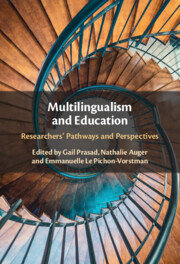Book contents
- Multilingualism and Education
- Multilingualism and Education
- Copyright page
- Contents
- Figures
- List of Contributors
- 1 Humanizing Research(ers) and Understanding How Concepts Evolve in Context
- 2 Become a Teacher-Researcher to Find Your Turkish
- 3 Between Languages, Norms and Social Variations
- 4 Learning to Language, Learning to Live:
- 5 A Retrospective Look at Multi/Pluri/Linguistic Transformations
- 6 Multilingualism as Lived, Felt and Evolving through Dialogue and Melody of Life
- 7 Revisiting the “Plurilingual-Intercultural” Orthodoxy
- 8 The Languages That Started to Flourish in Our Childhood, Developed over Time into Beautiful Blooming Meadows
- 9 On the Borderline between Languages and Knowledge
- 10 Multilingualism as Part of Social Reality
- 11 Some Elements of Family History and Language Biography
- 12 My Trajectory in Languages and Language Learning
- 13 Multilingualism as Norm
- 14 From Patois to Inter-comprehension Issues
- 15 Biography, Linguistic Coexistence, and Epistemological Reflection
- 16 Fighting off Zombies in France’s Multilingual Education
- 17 From Language Planning to the Didactization of Plurilingualism
- 18 A Sociolinguistic Biography and Understandings of Bilingualism
- 19 Experiential and Research Journey
- 20 Multimodality and Multilingualism
- 21 Researching Multilingualism and Language Education across Borders and over Decades
- 22 Possible Selves
- 23 Feeling at Home across Languages, Schools and Countries
- 24 From Monolingual Habitus to Plurilingual Education
- 25 My Path toward Awareness of Languages and Linguistic Diversity
- 26 A Personal Journey
- 27 Cultivating Plurilingual Gardens
- 28 Unbecoming a Monolingual Anglophone
- 29 From Plurilingual Experiences to Pluri-Artistic Practices
- 30 A Personal and Professional Journey to Multilingualism
- 31 Journey towards a Translanguaging Pedagogy for Social Justice
- 32 From Language Biography to a Research Life’s Journey
- 33 My Linguistic Biography
- 34 Travelling Back and Forth between Local Language Variation and Global Multilingualism
- 35 A Reflection on Generational Diaspora and Resulting Linguistic Acclimatization
- 36 On Language(s), Education and Dynamic Language Users
- Index
- References
2 - Become a Teacher-Researcher to Find Your Turkish
Published online by Cambridge University Press: 02 June 2022
- Multilingualism and Education
- Multilingualism and Education
- Copyright page
- Contents
- Figures
- List of Contributors
- 1 Humanizing Research(ers) and Understanding How Concepts Evolve in Context
- 2 Become a Teacher-Researcher to Find Your Turkish
- 3 Between Languages, Norms and Social Variations
- 4 Learning to Language, Learning to Live:
- 5 A Retrospective Look at Multi/Pluri/Linguistic Transformations
- 6 Multilingualism as Lived, Felt and Evolving through Dialogue and Melody of Life
- 7 Revisiting the “Plurilingual-Intercultural” Orthodoxy
- 8 The Languages That Started to Flourish in Our Childhood, Developed over Time into Beautiful Blooming Meadows
- 9 On the Borderline between Languages and Knowledge
- 10 Multilingualism as Part of Social Reality
- 11 Some Elements of Family History and Language Biography
- 12 My Trajectory in Languages and Language Learning
- 13 Multilingualism as Norm
- 14 From Patois to Inter-comprehension Issues
- 15 Biography, Linguistic Coexistence, and Epistemological Reflection
- 16 Fighting off Zombies in France’s Multilingual Education
- 17 From Language Planning to the Didactization of Plurilingualism
- 18 A Sociolinguistic Biography and Understandings of Bilingualism
- 19 Experiential and Research Journey
- 20 Multimodality and Multilingualism
- 21 Researching Multilingualism and Language Education across Borders and over Decades
- 22 Possible Selves
- 23 Feeling at Home across Languages, Schools and Countries
- 24 From Monolingual Habitus to Plurilingual Education
- 25 My Path toward Awareness of Languages and Linguistic Diversity
- 26 A Personal Journey
- 27 Cultivating Plurilingual Gardens
- 28 Unbecoming a Monolingual Anglophone
- 29 From Plurilingual Experiences to Pluri-Artistic Practices
- 30 A Personal and Professional Journey to Multilingualism
- 31 Journey towards a Translanguaging Pedagogy for Social Justice
- 32 From Language Biography to a Research Life’s Journey
- 33 My Linguistic Biography
- 34 Travelling Back and Forth between Local Language Variation and Global Multilingualism
- 35 A Reflection on Generational Diaspora and Resulting Linguistic Acclimatization
- 36 On Language(s), Education and Dynamic Language Users
- Index
- References
Summary
Mehmet- Ali Akinci begins by reminding us how schools in France at the beginning of the 20th century punished students caught speaking a dialect by forcing them to clean the toilets because they “had shit in their mouths!” Coming from a family of traditional immigrants from Turkey, he shows how “immigrant origin” often appears in the common imagination as a factor explaining their failure at school. His psycholinguistic background is marked by his fight against discrimination and glottophobia at school.
Keywords
- Type
- Chapter
- Information
- Multilingualism and EducationResearchers' Pathways and Perspectives, pp. 12 - 19Publisher: Cambridge University PressPrint publication year: 2022



